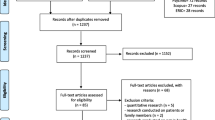Abstract
This paper will consider the significance of emotion in assessment through reflective or experiential writing in the context of professional practice-based learning. It is based on a 12 month study conducted with undergraduate social work students undertaking what are referred to as ‘reflective writing’ assessments. This form of assessment is a requirement in social work education and commonly used elsewhere in professional programmes of study in higher education such as nursing, business studies and education. Drawing on text orientated interviews with students and tutors this paper explores some of the challenges of both producing and assessing reflective writing. Drawing on debates relating to the assessment of reflective writing (Boud in Soc work Educ 18(2):121–132, 1999) and the benefits of experimental or ‘risky’ writing (Berman 2001), the paper offers some strategies for recognising and managing emotion arising from the inclusion of reflective writing professional education. In particular, it will explore the benefits of creating a space for dialogue which can recognise social, educational and historical factors, which influence individual students’ writing practices.
Similar content being viewed by others
Notes
Kleinian refers to the influential work of (and work developed from) Melanie Klein, a twentieth century Austrian child psychoanalyst.
References
Bazerman, C., & Prior, P. (2004). What writing does and how it does it: An introduction to analyzing texts and textual practices. Mahwah, N.J.: Lawrence Erlbaum Associates.
Berman, J. (2001). Risky writing: Self-disclosure and self-transformation in the classroom. Massachusetts: University of Massachusetts Press.
Boud, D. (1999). Avoiding the traps: seeking good practice in the use of self-assessment and reflection in professional courses. Social work Education, 18(2), 121–132.
Chelune, G. J. (1979). Self-disclosure: Origins, patterns and implications of openness in interpersonal relationships. San Francisco: Jossey-Bass.
Clark, R., & Ivanič, R. (1997). The politics of writing. London: Routledge.
Creme, P. (2000). The ‘personal’ in university writing: uses of reflective learning journals. In M. Lea & B. Strierer (Eds.), Student writing in higher education: New contexts (pp. 97–111). Buckingham: Open University Press.
Creme, P. (2005). Should student learning journals be assessed? Assessment and evaluation in higher education, 30(3), 287–296.
Engel, R. J., & Scutt, R. K. (2005). The practice of research in social work, London: Sage.
Evans, D. (1996). An introductory dictionary of Lacanian psychoanalysis. London: Routledge.
Freud, S. (1916). Jokes and their relation to the unconscious. Harmondsworth: Penguin.
Frosh, S. (2002). Afterwords: The personal in gender, culture and psychotherapy. Basingstoke: Palgrave.
Goffman, E. (1963). Behaviour in public places: Notes on the social organization of gatherings. London: Free Press/Collier-Macmillan.
Henriques, J., Hollway, W., Urwin, C., Venn, C., & Walkerdine, V. (1998). Changing the subject: Psychology, social regulation and subjectivity. London: Routledge.
Hoadley-Maidment, E. (2000). From personal experience to reflective practitioner: Academic literacies and professional education. In M. Lea & B. Stierer (Eds.), Student writing in higher education: New contexts (pp. 165–178). Buckingham: Open University Press.
Ivanič, R. (1998). Writing and Identity: The discoursal construction of identity in academic writing. Amsterdam: John Benjamins.
Janks, H. (1999). Critical language awareness, journals, and student identities. Language Awareness, 8(2), 111–122.
Janks, H. (2002). Critical literacy: Beyond reason. Australian Educational Researcher, 29(1), 7–27.
Lacan, J. (1964). Four fundamental concepts of psychoanalysis (trans: Sheriden, A.). New York: Norten.
Layder, D. (2004). Social and personal identity: Understanding yourself. London: Sage.
Lillis, T. (2001). Student writing access, regulation and desire. London: Routledge.
Mitchell, J., & Rose, J. (Eds.). (1982). Feminine sexuality. London: Macmillan.
Moon, J. (2004). A handbook of reflective and experiential learning: Theory and practice. London: Routledge/Farmer.
Prior, P. (1998).Writing/disciplinarity: A sociohistoric account of literate activity in the academy. London: Lawrence Erlbrum associates.
Rai, L. (2008). Student writing in social work education. PhD Thesis, The Open University.
Stake, R. E. (1995). The art of case study research. London: Sage Publications Ltd.
Stierer, B. (2000). Schoolteachers writing at University: What kind of knowledge is at stake? Teacher Development, 4(2), 199–221.
Waller, M. (2000). Addressing student writing problems: Applying composition theory to social work education. Journal of Baccalaureate Social Work, 5(2), 161–166.
Winnicott, D. W. (1971). Playing and reality. London: Tavistock.
Winter, R., & Buck, A. (1999). Professional experience & the investigative imagination: The art of reflective writing. London: Routledge.
Author information
Authors and Affiliations
Corresponding author
Rights and permissions
About this article
Cite this article
Rai, L. Responding to emotion in practice-based writing. High Educ 64, 267–284 (2012). https://doi.org/10.1007/s10734-011-9492-1
Published:
Issue Date:
DOI: https://doi.org/10.1007/s10734-011-9492-1




